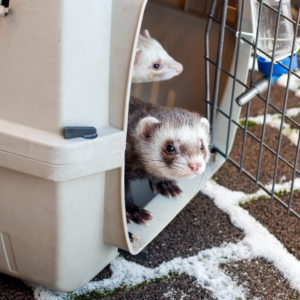As an affiliate, I may earn from qualifying purchases.
Introduction:
Creating a suitable habitat for your ferret is crucial to their well-being and happiness. This article will guide you through the necessary items and considerations for providing a comfortable and safe environment for your furry friend.
Choosing the Right Cage:
The safest place to keep your ferret when you’re not supervising them is in a cage. For a single ferret, you’ll need a cage that measures at least 30 inches in width, 18 inches in depth, and 18 inches in height. A well-equipped cage should include the following:
- Rectangular Litter Box: Place a rectangular litter box inside the cage to encourage proper bathroom habits.
- Heavy Food Bowl: Provide a sturdy, heavy food bowl to prevent tipping.
- Water Source: Offer a 16-oz. water bottle or a second heavy bowl for your ferret’s hydration needs.
- Sleep Area: Include a comfortable sleep sack or sweatshirt where your ferret can rest.
- Hammock: A hammock provides a cozy spot for your ferret to relax and play.
Supervised Free Roam:
While ferrets enjoy exploring, allowing them to roam freely around the house should only be done when you can supervise them closely. Keep in mind that ferrets tend to adapt their waking hours to match your schedule and sleep for most of the day. Therefore, a large cage is primarily their bedroom and not a necessity for their comfort.
Litter Training:
Many ferrets can be litter trained, although it’s normal for them to occasionally miss the litter pan. To facilitate litter training, ensure you have a suitable litter box available. We recommend using wood pellets designed for stoves. They are cost-effective and available at hardware and fireplace stores. Avoid other litters, as clumping sand litter may cause lung issues when inhaled, and clay litter can harm sensitive foot pads.
Safety Considerations:
When setting up your ferret’s habitat, safety should be a top priority. Avoid using wood shavings in the cage, as ferrets have sensitive respiratory systems that can be irritated by wood resins. Additionally, wood chips and clumping litter can be ingested, leading to expensive surgeries.
Other Essential Items:
Consider these additional items for your ferret’s care:
- Ferret Harness: For outdoor walks, choose a secure harness like the Premier 5 n 1 harness or the Marshall Farms harness to prevent escapes.
- Carrier: A reliable carrier is essential for transporting your ferret. Ensure it’s escape-proof, as ferrets are clever escape artists.
Conclusion:
Creating an appropriate living space for your ferret is essential for their health and happiness. Provide them with a well-equipped cage, offer supervised free roam time, and invest in litter training to maintain a clean environment. Additionally, prioritize safety and choose the right equipment, such as a harness and carrier, to ensure your ferret enjoys a safe and enriching life as your cherished pet.




